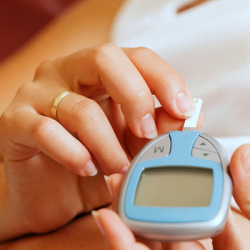Roux-en-Y, the most common type of gastric bypass surgery, can lead to remission of type 2 diabetes along with weight loss. A new study in the American Journal of Physiology -- Regulatory, Integrative and Comparative Physiology examines why, finding that insulin sensitivity of the main glucose (sugar) storage sites in the body improve after gastric bypass surgery. Insulin is … [Read more...]
Diabetes News

Drug developed to prevent gastrointestinal side effects of Diabetes: A Study
Up to 80% of individuals living with long-term type 1 diabetes experience gastrointestinal symptoms such as abdominal distension, irritable bowel syndrome, and fecal incontinence. A study publishing October 1 in Cell Stem Cell reveals why these symptoms arise and tests an investigational drug in mice that could prevent them from developing. It's unclear why diabetic patients … [Read more...]
Lung disease may increase risk of insulin resistance and diabetes: A Study
Numerous studies have identified obesity and poor diet as risk factors for insulin resistance and diabetes. A new study adds another risk factor to the list: inflammatory lung disease. Published in the American Journal of Physiology -- Regulatory, Integrative and Comparative Physiology, the study reports that inflammation in the lungs is enough to induce the body-wide … [Read more...]
Chemical exposure linked to rising diabetes and obesity: The Endocrine Society Study
Emerging evidence ties endocrine-disrupting chemical exposure to two of the biggest public health threats facing society -- diabetes and obesity, according to the executive summary of an upcoming Scientific Statement issued today by the Endocrine Society. The statement's release comes as Society experts are addressing a global meeting, the International Conference on … [Read more...]
Diabetes medication could be used to treat alcohol dependence: University of Gothenburg Study
A new study on mice and rats at Sahlgrenska Academy shows that a medication used for diabetes and obesity also could be a valuable tool for the treatment of alcohol dependence. Alcohol dependence causes morbidity as well as mortality and is major health problem in today's society. The costs for alcohol dependence in Sweden are estimated to be around SEK 45 billion per … [Read more...]
Analysis of 21 studies shows exposure to pesticides is associated with increased risk of developing diabetes
A meta-analysis of 21 studies presented at this year's annual meeting the European Association for the Study of Diabetes (EASD) shows that exposure to pesticides is associated with increased risk of developing diabetes by 61%, with different types of pesticides showing varying levels of risk. The study is by Giorgos Ntritsos, University of Ioannina, Greece, and Dr Ioanna … [Read more...]
Better blood sugar control can help prevent decline in mental ability: A Study
People who have diabetes and experience high rates of complications are more likely to develop dementia as they age than people who have fewer diabetic complications, according to a new study published in the Endocrine Society's Journal of Clinical Endocrinology & Metabolism. An individual develops diabetes when the pancreas doesn't produce enough of the hormone insulin … [Read more...]
Diabetes linked to bone health: University of Delaware Study
Diabetes, which now affects almost 30 million Americans, can cause serious health complications, including heart disease, blindness, kidney failure and lower-extremity amputations. A lesser-known but equally grave complication is the effect of diabetes on bone health. "Clinical trials have revealed a startling elevation in fracture risk in diabetic patients," says Liyun … [Read more...]
Women exposed to organic pollutants in early pregnancy have more than four-times increased risk of gestational diabetes: A Greek Study
New research presented at this year's annual meeting of the European Association for the Study of Diabetes in Stockholm shows that a 10-times increased exposure to organic pollutants in early pregnancy is associated with a 4.4 times increased risk of a pregnant woman developing gestational diabetes. The research is by Assistant Professor Leda Chatzi, University of Crete, … [Read more...]
Diabetes drug metformin’s primary effect is in the gut, not the bloodstream: University of North Carolina Study
Although metformin was introduced as a treatment for type 2 diabetes nearly 60 years ago and is now the recommended first-line treatment for newly diagnosed patients, researchers still debate precisely how the drug works. Now, a study published online in Diabetes Care by researchers at the University of North Carolina School of Medicine, Elcelyx Therapeutics, and other leading … [Read more...]
Brief bouts of exercise begin to reverse heart abnormalities in people with type 2 diabetes: A Study
A new study in Diabetologia (the journal of the European Association for the Study of Diabetes) is the first to show that high intensity intermittent exercise training improves heart structure and benefits diabetes control in patients with type 2 diabetes. The study is led by Professor Michael Trenell and Dr Sophie Cassidy from Newcastle University (UK) and was funded by the … [Read more...]
New strategy to lower blood sugar may help in diabetes treatment: A Washington University Study
Some treatments for type 2 diabetes make the body more sensitive to insulin, the hormone that lowers blood sugar. But new research at Washington University School of Medicine in St. Louis suggests a different strategy: slowing the production of glucose in the liver. Working in mice, the researchers showed they could reduce glucose production in the liver and lower blood … [Read more...]
Interrupting sitting with walking breaks improves children’s blood sugar: Endocrine Society Study
Taking 3-minute breaks to walk in the middle of a TV marathon or other sedentary activity can improve children's blood sugar compared to continuously sitting, according to a new National Institutes of Health (NIH) study published in the Endocrine Society's Journal of Clinical Endocrinology & Metabolism (JCEM). A sedentary lifestyle can put children at risk of developing … [Read more...]
Surgery achieves better long-term control of type 2 diabetes than standard therapy: King’s College London Study
Metabolic or bariatric surgery may be more effective than standard medical treatments for the long-term control of type 2 diabetes in obese patients, according to a new study by King's College London and the Universita Cattolica in Rome, Italy. The study, published in the Lancet, is the first to provide data on five-year outcomes of surgery from a randomized clinical trial … [Read more...]
Medication improves measure of kidney disease in patients with diabetes
Among patients with diabetes and kidney disease, most receiving an angiotensin-converting enzyme inhibitor or an angiotensin receptor blocker, the addition of the medication finerenone compared with placebo resulted in improvement in albuminuria (the presence of excessive protein [chiefly albumin] in the urine), according to a study in the September 1 issue of JAMA. Diabetes … [Read more...]
Diabetic Eye Injection: A Shot for Life
Diabeties is a leading cause of blindness in American adults. Partially because it is often missed until it is too late. Now, a new treatment is helping save patients’ sight. Sixty-eight year old Charles Cavill was in danger of losing his sight, but now, for the first time in years, he can play golf again. Cavill told Ivanhoe, “When you can’t make good contact with the ball … [Read more...]
Neck manipulation may be associated with stroke: American Heart Association Study
Manipulating the neck has been associated with cervical dissection, a type of arterial tear that can lead to stroke. Although a direct cause-and-effect link has not been established between neck manipulation and the risk of stroke, healthcare providers should inform patients of the association before they undergo neck manipulation. Treatments involving neck manipulation may … [Read more...]
Traditional Chinese medicines stall progression of diabetes: Endocrine Society Study
Traditional Chinese herbal medicines hold promise for slowing the progression from prediabetes to an official diabetes diagnosis, according to new research accepted for publication in the Endocrine Society’s Journal of Clinical Endocrinology & Metabolism (JCEM). Prediabetes is diagnosed an individual has developed elevated blood sugar levels, but glucose levels have not … [Read more...]
Scientists report success using zebrafish embryos to identify potential new diabetes drugs
In experiments with 500,000 genetically engineered zebrafish embryos, Johns Hopkins scientists report they have developed a potentially better and more accurate way to screen for useful drugs, and they have used it to identify 24 drug candidates that increase the number of insulin-producing cells in the pancreas. The novel fish embryo technique, which the researchers say … [Read more...]
Long-term effects of blocking inflammation: University of Cambridge Study
Inflammation -- the body's response to damaging stimuli -- may have a protective effect against cardiovascular disease, according to a study published today in the journal Lancet Diabetes and Endocrinology. The finding is one of the outcomes of research using a powerful new genetic tool that mimics the behaviour of certain anti-inflammatory drugs. The technique allows … [Read more...]
Grape skin extract may soon be answer to treating diabetes: A Wayne State University Study
The diabetes rate in the United States nearly doubled in the past 10 years. Approximately 26 million Americans are now classified as diabetic, stressing an urgent need for safe and effective complementary strategies to enhance the existing conventional treatment for diabetes. Preliminary studies by researchers at Wayne State University have demonstrated that grape skin … [Read more...]
Diabetes, previous joint pain and overall physical health predicts arthritis pain: American Academy of Orthopaedic Surgeons Study
Diabetes and previous joint pain, along with a patient's overall physical health status, may predicts arthritis pain with nearly 100 percent accuracy, in new research presented today at the 2015 Annual Meeting of the American Academy of Orthopaedic Surgeons (AAOS). An estimated one out of five adults is living with an arthritis diagnosis, according to the U.S. Centers for … [Read more...]
Diabetics who skip breakfast provoke hazardous blood sugar spikes
Very little was known regarding the effect of skipping breakfast on the health of diabetics -- until now. A new Tel Aviv University study reveals the substantial impact of skipping breakfast on type-2 diabetics. "Fasting" until noon triggers major blood sugar spikes (postprandial hyperglycemia) and impairs the insulin responses of type-2 diabetics throughout the rest of the … [Read more...]
New non-invasive device for diabetes patients
According to data from the 2014 National Diabetes Statistics Report, over 9.3% of the American population has diabetes, and over 8.1 million cases were undiagnosed. Patients with the disease have to watch their blood glucose levels and the traditional way was through finger pricking and test strips. But researchers at the University of Leeds, UK have developed a device that … [Read more...]
Link between Type 2 diabetes and cognitive impairment with regard to different cultures: A Study
Diabetes is a known risk factor for cognitive decline and dementia, age-related conditions that affect memory and thinking skills. However, little is known about how the diabetes-cognitive decline link compares across cultures. Scientists from Mayo Clinic and Huashan Hospital in Shanghai explored the association between Type 2 diabetes and cognitive impairment to find out if … [Read more...]
New potential anti-diabetes compound found: A Harvard School of Public Health Study
A new drug screening technology developed at the Harvard T.H. Chan School of Public Health has identified a new potential anti-diabetes compound--and a powerful way to quickly test whether other molecules can have a positive effect on a critical molecular pathway believed to be central to diseases ranging from diabetes to retinitis pigmentosa, cystic fibrosis, Huntington's … [Read more...]
Diabetes medication reduces dementia risk: A Study
Patients with type 2 diabetes have a dysfunctional sugar metabolism because the essential hormone insulin does not work effectively. Once the disease reaches an advanced stage, the body stops producing insulin altogether, which means that it has to be administered externally. Type 2 diabetes most commonly occurs in late adulthood, and it has long been known that it can affect … [Read more...]
South Asian people management of diabetes linked to cultural and social beliefs: A Manchester University Study
Researchers from The University of Manchester in collaboration with Keele and Southampton Universities have published new findings which shed light on the poor outcomes of South Asian people with diabetes in the UK. Analysis of interviews with South Asian people, published in a paper in the journal BMC Family Practice, shows that especially among first generation immigrants, … [Read more...]
“Smart” Insulin: Medicine’s Next Big Thing?
Imagine how tough it is for new parents to find out their baby has diabetes and then have to learn as they go how to regulate blood sugar and dose insulin. A mistake could bring coma or death. But now, a researcher in Utah’s “smart” insulin could someday eliminate guesswork and more. Seven-year-old Foster Dunstan was diagnosed with type I diabetes as a baby. Tricia … [Read more...]
Ultrasound accelerates skin healing in diabetics: A University of Sheffield Study
Healing times for skin ulcers and bedsores can be reduced by a third with the use of low-intensity ultrasound, scientists from the University of Sheffield and University of Bristol have found. Researchers from the University of Sheffield's Department of Biomedical Science discovered the ultrasound transmits a vibration through the skin and wakes up cells in wounds helping … [Read more...]
- « Previous Page
- 1
- …
- 6
- 7
- 8
- 9
- 10
- …
- 24
- Next Page »





























